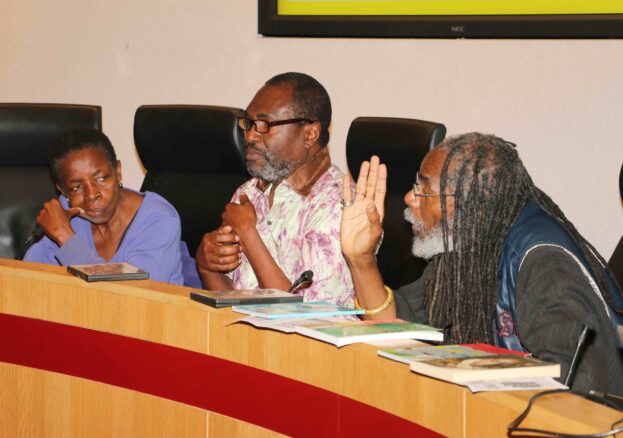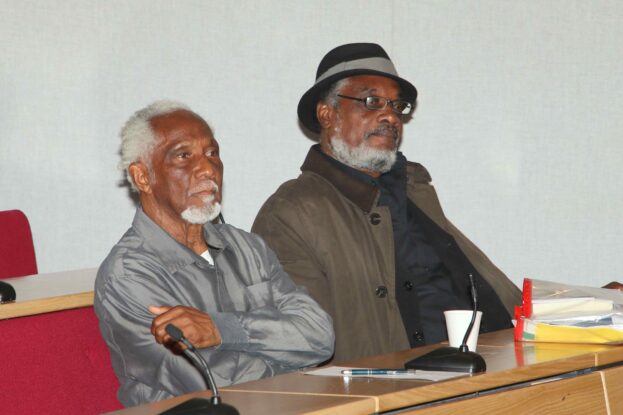
Altheia Jones Lecointe, Kwaku and Cecil Gutzmore at a BTWSC event
Police Chief Constable’s Apology To The British African Community To Be Discussed At Community Meeting
Nov. 4 2021
An apology to the British African community for historic injustice by British Transport Police (BTP) Chief Constable Lucy D’Orsi QPM will be part of the topics of discussion at the Police And The Criminalising Of British African Youths By Numbers 2 Zoom meeting on November 8.
A resolution to seek an apology was made at the earlier iteration of the event organised by BTWSC/African Histories Revisited last September. It was decided that the BTP should make an apology that goes beyond the victims of two cases that have recently been overturned, as Britain’s African heritage community suffered trauma during the reign of terror by rogue police officer DS Derek Ridgewell and colleagues, particularly in the 1970s.
“I am sincerely sorry for the trauma suffered by the British African community through the criminal actions of former police officer DS Derek Ridgewell who worked in BTP during the 1960s and 70s. In particular, it is of regret that we did not act sooner to end his criminalisation of British Africans, which led to the conviction of innocent people. This is simply inexcusable and is something that my colleagues and I are appalled by,” states the Chief Constable.
The infractions by former BTP police officer DS Derek Ridgewell led to several African youths being jailed in the 1970s.
The approach to the BTP also included suggestions, such as a bursary for a young person of African heritage with an admission to study law or criminology in a British university. The Chief Constable responded to this proposal, saying: “I am very keen to explore this proposal. I cannot confirm any arrangements at this stage, but I hope to communicate on our plans in due course.”
It was also suggested that BTP officers should be provided with anti-racism, and African history and culture workshops, to improve their engagement with the British African community. To this, the BTP responded, saying: “BTP is committed to combating racism, which includes Afriphobia, which led to these historic cases that targeted African youths and destroyed lives.
“To demonstrate our commitment to a positive future, we will continue to explore how best to improve our people’s knowledge and understanding of anti-racism and African history and culture, through their continued professional development. This is something I know my colleagues feel passionately about.” (See below for the full apology.)
DS Ridgewell and his colleagues, who were responsible for policing London’s underground railway system, routinely fitted up several African youths on false charges. Some of his victims became known as the Waterloo Four, Oval Four, Stockwell Six and the Tottenham Court Road Two.
Ridgewell’s reign of terror in trains or at train stations came to an end, when he was quietly transferred from the underground to work in a south London mail depot investigating mail theft.
The transfer came about when Ridgewell’s evidence in the 1973 Tottenham Court Road Two case was so unbelievable, that Judge Gwyn Morris halted the case involving two accused Jesuit students from Oxford University. The judge, in closing the collapsed case, said: “I find it terrible that here in London people using public transport should be pounced upon by police officers without a word.”
Ridgewell’s criminal bent led to him being jailed, when it was discovered that he was in league with the very criminals he was supposed to be investigating, and with whom he shared the proceeds from the stolen mailbags. He died of a heart attack in prison in 1982, whilst serving a seven year imprisonment.
In the last two years, the wrongful convictions of the Oval Four and Stockwell Six, in which DS Ridgewell gave false evidence, have been overturned at the Court of Appeal. In each case, a senior BTP officer offered an apology to the victims of the quashed case.
However, Winston Trew, who was one of the Oval Four and a guest at the September meeting, was supportive of the suggestion that the BTP apologise to the British African community, which also suffered as a consequence of Ridgewell’s rogue activities.

Eric Huntley and Winston Trew at a BTWSC event
The BTP’s apology will form part of the video screening and discussion led by history consultant Kwaku and veteran community activist Cecil Gutzmore on Zoom next Monday, November 8. For more details: AfricanHistoryPlus.eventbrite.com.
The Full Official Statement:
OFFICIAL
“On behalf of the British Transport Police (BTP), I am sincerely sorry for the trauma suffered by the British African community through the criminal actions of former police officer DS Derek Ridgewell who worked in BTP during the 1960s and 70s. In particular, it is of regret that we did not act sooner to end his criminalisation of British Africans, which led to the conviction of innocent people. This is simply inexcusable and is something that my colleagues and I are appalled by. The actions of DS Ridgewell do not define the BTP of today which is enriched by highly professional, kind and committed officers and staff who are passionate about protecting the public. I have also met retired officers who are equally appalled by the criminal actions of DS Derek Ridgewell. I acknowledge that, during those times, systemic racism played a role in the culture of the Force, as it did across many parts of society.
Moving forwards, I would like to engage and work closer with the British African community. We cannot undo the past, but we can learn from it. This is an important and sombre point of reflection in our history. BTP is committed to combating racism, which includes Afriphobia, which led to these historic cases that targeted African youths and destroyed lives.
To demonstrate our commitment to a positive future, we will continue to explore how best to improve our people’s knowledge and understanding of anti-racism and African history and culture, through their continued professional development. This is something I know my colleagues feel passionately about.
Regarding the matter of the BTP instituting a bursary for a British African youth who has gained admission to read law or criminology in a British university, I am very keen to explore this proposal. I cannot confirm any arrangements at this stage, but I hope to communicate on our plans in due course.
I can commit to you that under my leadership, BTP will continue to strive to do better every day. Inspiring the confidence of the communities we serve is only possible through listening, caring, learning and becoming truly representative of those we ask to place their trust in us. In this regard, I will continue to actively aim our recruitment at the British African community, amongst others, to build a more diverse workforce to reflect the travelling public. I would therefore urge any British African who would be proud to protect the vulnerable and make the railway a hostile environment to criminals, to consider a career with BTP.
Finally, I would like to reiterate my sincere apology for the trauma caused to the British African community by a corrupt BTP officer, whose misuse of his powers caused harm not only to the innocent young people criminalised, but also to their families and community.”
Chief Constable Lucy D’Orsi QPM
ENDS
Kwaku
bbmbmc@gmail.com
Awula Serwah
btwsc@hotmail.com
https://AfricanHistoryPlus.eventbrite.com
